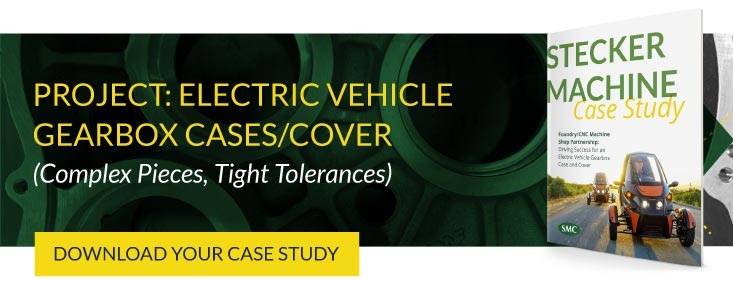Few industries are growing as rapidly as electric vehicle (EV) production. This urgency is pushing manufacturers to constantly seek innovative solutions to enhance efficiency, precision, and reliability while integrating advanced manufacturing techniques.
Two particular EV components — the lithium battery and drivetrain systems — are particular challenges because of the high levels of accuracy required during machining.
This provides opportunities for Computer Numerical Control (CNC) machining. Electric vehicle manufacturing and CNC machining are a perfect union, delivering numerous benefits as the industry pushes for sustainable, efficient, and high-quality electric vehicle production.
40% by 2030? Or maybe 50%!
U.S. passenger car sales that are electric vehicles could reach 40% by 2030. Some optimistic projections say 50% or more in just 6 years, according to S&P Global Mobility. That’s why the Infrastructure Investment and Jobs Act (signed into law November 2021) allocated $7.5 billion to building a nationwide charging network.
CNC Machining in EV Manufacturing
Gaining steam during the pandemic’s supply chain challenges, the transition from internal combustion engine vehicles to EVs was mainly focused on reducing weight, enhancing precision for battery pack production, and extending the lifespan of internal components.
CNC machining is known for its precision and versatility, but it offers many more advantages. When it comes strictly to the EV manufacturing process, CNC machining provides some key benefits:
1. Precision and Quality
CNC machining’s unparalleled accuracy ensures that parts nail demanding specifications, which is crucial to meeting EVs’ high-performance and safety standards. This precision is especially vital in components like motor housings and battery enclosures, where even minor flaws can significantly impact performance and safety.
2. Overall Speed and Efficiency
With its ability to operate 24/7 and automate complex processes, CNC machining greatly reduces production times. This efficiency helps keep up with the growing demand for EVs, enabling manufacturers to scale production while maintaining quality.
3. Consistency
The core of CNC machining is repeating the same process again and again. This results in consistent, repeatable parts and components all produced to meet high standards that drive vehicle performance.
4. Customization and Flexibility
The adaptability of CNC machines allows for easy customization, making them ideal for producing specialized parts and even prototypes. Combine that with invaluable flexibility (manufacturers can instantly respond to design or production changes), and now staying competitive in the fast-paced EV industry is a bit easier.
5. Smart Software
Leveraging innovative CAM software — such as Mastercam — allows CNC machine shops to optimize their production processes. Mastercam's capabilities in generating optimized toolpaths and ensuring efficient, error-free production are pivotal in meeting the unique demands of EV manufacturing.
6. Sustainability
CNC machining’s precision reduces waste material, and its efficiency can lower energy consumption per part produced. Helping to meet sustainability goals mirrors many EV manufacturers’ philosophies.
Key Applications of CNC Machining in EV Production
CNC machining’s versatility makes it right for a wide range of applications within EV manufacturing:
- Motor and Drivetrain: Precision is critical when manufacturing electric motors and drivetrain systems. CNC machining assures the high tolerance and exacting specifications of motor shafts and housings are met, contributing to the overall efficiency and performance of the vehicle.
- Battery Enclosures and Frames: The structural components that house electric batteries must meet exact specifications to fulfill safety and durability requirements. The production of components with the required precision and strength is possible with CNC machining.
- Cooling Systems: Electric vehicles require efficient cooling systems to manage heat generated by batteries and motors. CNC machining is used to create complex cooling system components and intricately designed parts, which allows for proper thermal management.
Not Just Beneficial, It’s Essential
EV manufacturing like many industries rely on CNC machining. The precision, efficiency, customization, and sustainability offered by CNC machining fits the needs of the EV industry. Plus, some CNC machine shops have decades of experience machining for other on-highway vehicles, so the familiarity is there.
As manufacturers continue to innovate, CNC machining will surely play an important role in shaping the future of EVs. You’ve seen the big picture view; now look into the details within our case study on an EV gearbox case and cover. Click below for instant access.







